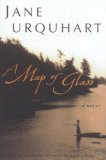Summary | Excerpt | Reading Guide | Reviews | Beyond the Book | Readalikes | Genres & Themes | Author Bio

Critics' Opinion:
Readers' Opinion:
First Published:
Mar 2006, 375 pages
Paperback:
Mar 2007, 375 pages
 Book Reviewed by:
Book Reviewed by:
BookBrowse Review Team
Buy This Book
In this daydream there are men with poles standing on the raft’s surface.
Sometimes they are dancing. Sometimes they are kneeling, praying.
When he comes to a break in the forest, he is perplexed by an area of
openness that curls off to the left and to the right.
Then, quite suddenly, inexplicably, he remembers a fact about winter rivers
and their tributaries, how they become frozen, covered with snow. He is
momentarily aware of some of the natural things he used to think about. He
enunciates, quite clearly,
the syllables of the word watershed, then straightens his shoulders,
attentive to, and briefly suspicious of, the deep, bell-like sound of his own
voice.
He walks for some time on the hard, pale river, his left sleeve now and then
brushing against the arms of snow-laden pines.
Eventually his body comes to know it is exhausted and takes the decision to
lie on the smooth bed of ice and snow. By now the sun is gone; it is a deep
winter night of great clarity and great beauty.
He can see points of light that he knows are stars, and yet he no longer
knows the word for stars. When he rolls his head to the left and then the right,
the still, leafless branches of the trees on the bank move with him, black
against a darkening sky.
“Tributaries,” he whispers, and the word fills him with comfort, and also
with something larger, something that, were he able to recognize it, would
resemble joy.
He sleeps for a long time. And when he wakens he discovers that his body has
been covered by a thick, drifting blanket that is soft and cold and white. The
whole unnamed world is so beautiful to him now that he is aware he has left
behind vast, unremembered territories, certain faces, and a full orchestra of
sounds that he has loved. With enormous difficulty he lifts his upper body from
the frozen, snow-covered river and allows his arms to rest on the drift in front
of him. The palms of his gloved hands are open to the sky as if he were silently
requesting that the world come back to him, that the broken connections of heart
and mind be mended, that language and the knowledge of a cherished place
re-enter his consciousness. He remains alert for several moments, but eventually
his spine relaxes and his head droops and he says, “I have lost everything.”
This is his first full sentence in more than a month. These are his last
spoken words. And there is nobody there to hear his voice, nobody at all.
The Revelations
At the northeastern end of Lake Ontario, toward the mouth of the wide St.
Lawrence River, a number of islands begin to appear.
Some of these are large enough to support several farms, a pattern of roads,
perhaps a village, and are still serviced year-round by a modest flotilla of
ferries that departs from and returns to Kingston Harbour. One or two minor
islands are completely deserted in winter, having always been summer playgrounds
rather than places of employment. There is a small, difficult-toreach island,
however, an island that a hundred years ago was busy with ships and lumber, that
is now a retreat for visual artists and, for this reason, its single serviceable
nineteenth-century building – a sail loft – has been renovated as a studio
where an artist can live and work for a limited period of time, alone.
On the final leg of his journey from his Toronto studio to this sail loft,
Jerome McNaughton had kept his back to the mainland view and had watched instead
the skeletal trees and tilting grey buildings on the island grow in size and,
behind them, the less definable evergreen forest enlarging, like a motionless
black cloud, as the boat drew nearer. He had chosen the equinoctial period of
late winter, early spring for his residency on the island, and he had chosen it
because of the transience he associated with the heavy sinking snow, the
dripping icicles of the season. The difficulty of arriving at the place when the
ice was either uncertain or breaking up altogether – the enforced isolation
brought about by these difficulties – had attracted him as well.
From A Map of Glass by Jane Urquhart. Copyright Jane Urquhart 2005. All rights reserved. Reproduced by permission of MacAdam/Cage Publishing.




The worth of a book is to be measured by what you can carry away from it.
Click Here to find out who said this, as well as discovering other famous literary quotes!
Your guide toexceptional books
BookBrowse seeks out and recommends the best in contemporary fiction and nonfiction—books that not only engage and entertain but also deepen our understanding of ourselves and the world around us.